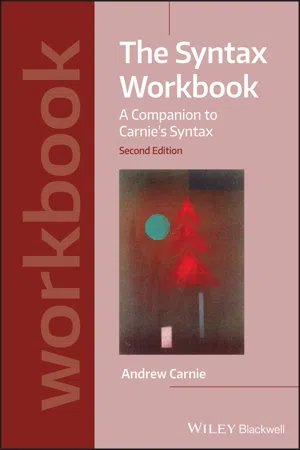
- English
- ePUB (mobile friendly)
- Available on iOS & Android
About this book
A valuable companion to Andrew Carnie's Syntax: A Generative Introduction, 4th Edition, full of practice questions and engaging exercises to promote student comprehension
Syntax: A Generative Introduction, Fourth Edition,?is the leading textbook for undergraduate courses in the syntax, covering foundational topics such as universal grammar, parts of speech, constituency, trees, structural relations, binding theory, x-bar theory, and movement, as well as advanced subjects such as control theory, ellipsis, polysynthesis, incorporation, non-configurationality,?and ?Merge. Written by Syntax author Andrew Carnie, The Syntax Workbook has been purposefully designed to support and complement the use of Syntax in the undergraduate classroom. The Syntax Workbook?is the perfect companion?to the author's seminal textbook and contains updated practice material for every section of the text. This workbook:?
- Includes exercises, practice questions, data analysis, and knowledge application questions for each section in Syntax: A Generative Introduction, Fourth Edition
- Features exercises and questions with full answers and explanations to assist students in learning to apply theory to practice?
- Has been authored by leading figure in syntax Andrew Carnie to support classroom usage of Syntax: A Generative Introduction, Fourth Edition?
- Works in concert with a student companion website, offering a robust selection of learning tools for the classroom?
Ideal for undergraduate courses in syntax,?Syntax: A Generative Introduction, Fourth Edition, and The Syntax Workbook, Second Edition, together offer a perfect combination of thorough coverage and valuable practice. The workbook can be purchased on its own or in a set with the textbook.?
Available as a set with Syntax: A Generative Introduction, 4th Edition
Frequently asked questions
- Essential is ideal for learners and professionals who enjoy exploring a wide range of subjects. Access the Essential Library with 800,000+ trusted titles and best-sellers across business, personal growth, and the humanities. Includes unlimited reading time and Standard Read Aloud voice.
- Complete: Perfect for advanced learners and researchers needing full, unrestricted access. Unlock 1.4M+ books across hundreds of subjects, including academic and specialized titles. The Complete Plan also includes advanced features like Premium Read Aloud and Research Assistant.
Please note we cannot support devices running on iOS 13 and Android 7 or earlier. Learn more about using the app.
Information
Part 1
Preliminaries
Chapter 1
Generative Grammar
WORKBOOK EXERCISES
WBE1. PRESCRIPTIVE RULES
- What did you put the present in?
- She’s smarter than him.
- To boldly go where no one has gone before!
- He walks too slow.
- Hopefully, the weather will turn sunny soon.
- I found out something which will disturb you greatly.
- Who did you see?
- I can’t hardly sleep.
- 10 items or less [a sign above a register in the grocery store]
- My view of grammar is different than yours.
- I will not enjoy it.
- If I was a linguist, then I wouldn’t have to study prescriptive rules.
- The homework wasn’t done completely.
- All of the linguists at the conference congratulated each other.
- Me and John are going to the movies later.
- I want to learn a new language like French.
WBE2. SCIENTIFIC METHOD PRACTICE1
- Grizelda hasn’t eaten anything. Statement
- Hasn’t Grizelda eaten anything? Yes/No qu...
Table of contents
- Cover
- Table of Contents
- Dedication
- Title page
- Copyright Page
- Preface
- Part 1: Preliminaries
- Part 2: The Base
- Part 3: Movement
- Part 4: Advanced Topics
- References
- Index
- End User License Agreement